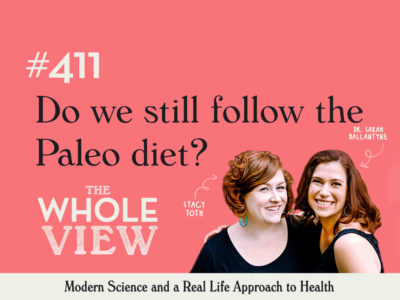On this episode, Sarah and Stacy challenge listeners to avoid the beach body mentality as we head into the summer season. Learn about the physical impact of these yo-yo diets that are pushed by the beach body movement, explore the science behind the long-term results of weight swings, and arm yourself with a mindset that promotes living to be healthy instead of living to be thin. Enjoy!
If you enjoy the show, please review it on iTunes!
The Paleo View (TPV), Episode 353: Beach Body Yo-Yo
-
-
(0:41) Welcome
- Hello listeners! Welcome to Memorial Day weekend!
- We have the bathing suit show for you this week!
- Stacy and Sarah are both seeing a ton of ads popping up, pushing summer six-pack shame
- Stacy is seeing a lot of people speak up about pushing back against this pressure
- This is a guaranteed soap box show with lots of tangents, but trust that there will be tons of science as well
- Stacy has witnessed the clap-back against certain influencers within Instagram
- Celebrities calling out other celebrities for endorsing products that are actually destructive towards your health
- This week Stacy and Sarah will be talking about feelings, bodies, health, all the things that summer gives us the feels for
- Sarah sees the beach body marketing as nothing more than predatory marketing
- It gets people on the yo-yo
- When we buy into this marketing, we end up in a cycle of poor self-worth
- We then put ourselves on a restrictive diet and we lose the weight we think we are supposed to lose for summer so that we can fit what society tells us we are supposed to look like
- And then we maintain that for a couple of months, but when fall comes we fall into a weight gain period through the holidays
- There are so many people this is true for
- We end up having this cyclical weight loss and weight gain
- This yo-yo dieting is actually more harmful to our health than just staying overweight
- Going back and forth and cycling is way more harmful than loving our bodies, focusing on health, nutrients, activity, sleep, and managing stress
- Wherever you are feeling uncomfortable (as it pertains to your summer experiences), Stacy and Sarah hope to help you find ways to recalibrate your thinking
- Ultimately the yo-yo mindest isn’t just unhealthy physically, but it is also very unhealthy mentally and it puts us in a cycle of shame and negativity
- Years ago Stacy wrote a post about disordered eating and when/why/how to take a look at your eating choices to avoid disordered eating behaviors
- People need to be careful about even yo-yoing within the Paleo template with challenges
- It is so hard on your body and is so hard on your emotions
- This will really take a toll on how you are able to enjoy your summer
- Stacy shared how her body shame from when she was young impacted her summers, and how her mindset shifted when she had kids
- She realized that she didn’t want that shame mindset to impact her children and her experiences with them
- When you let go of these “ideals” the healthier you are mentally and the healthier you are physically because you aren’t hiding during the summer – you are getting out there, living and being active
- It is so important to push outside of our comfort zone, know that it is going to be uncomfortable at first, but it will be so worth it
-
(11:01) The Physical Impact of Yo-Yo Dieting
- Sarah wants to get into the physical side of this
- Why to let go of the mentality of having to look a certain way in order to have fun in the summer so that you can get away from yo-yo dieting
- When we are losing weight, we lose both body fat and lean muscle mass
- It is very challenging to design a plan to preserve muscle mass through fat loss
- It is not impossible, but most of the go-to ways for weight loss lead to muscle loss
- With most strategies, you are going to lose about a pound of muscle per pound of fat lost
- This is a typical body composition change while you are losing weight, especially through rapid weight loss strategies
- Ex: keto, low carb, severe calorie restriction, carb cycling
- The only way to avoid this is to eat a lot of protein and to carefully factor in the lifestyle pieces (like weight training, lots of sleep, and stress management)
- This is a typical body composition change while you are losing weight, especially through rapid weight loss strategies
- How much muscle you have on your body, versus how much fat you have on your body, is a better predictor of health
- If you have a lot of fat on your body, but you have a lot of muscle on your body as well, you don’t have an increased risk of chronic health problems compared to someone who is “skinny fat”
- When we lose weight, especially rapidly, we are losing that important muscle mass
- And then when we fall off the wagon and gain that weight back it is easier to put fat back on rather than muscle
- There is a lot of science looking at people who have gone through multiple weight loss cycles (aka the yo-yo) and these studies show that these people over time keep increasing their body fat percentages
- This causes a greater increase in risk for type 2 diabetes, cardiovascular diseases, and non-alcoholic fatty liver disease
- It would have been healthier to just stay at the starting (higher) weight than to yo-yo
- It is really important to emphasize that there are ways to lose weight in healthy ways
- However, the equation boils down to focusing on the health part versus the weight part
- Avoid the mentality of having to look a certain way so that we sacrifice health in order to be a certain weight
- This is exactly what yo-yo dieting is
- Even at the 10/15 pound cycle level, it is gradually shifting body composition over the cycles towards one that increases the risk of chronic disease
- It is sacrificing health for weight
- Stacy is so in love with everything that Sarah said wants her to physically drop the mic
- The news article Stacy and Sarah discuss
- The graphs Stacy mentioned:

- Stacy shared her experience with losing a massive amount of weight multiple times and what happened when she went back to her “normal life” and how this impacted her over time
- More info on the study that produced the graph:
- 13 of the 14 Biggest Loser contestants regained the weight they lost
- 4 of them are heavier now than they were before the competition
- And nearly all of the contestants have slower metabolisms than before the competition and burn fewer calories than expected
- It makes it so much harder to not gain weight when your metabolism and hormones are all out of whack from having this huge loss and then regain
- The other thing to consider with weight loss is that you are releasing hormones that are stored in your body fat every time you lose weight
- Some of these can be negative as well
- So every time you lose weight you are putting yourself in a detox cycle with every yo-yo
- Let’s say together as a community of friends that it is silly to subscribe to the idea that you have to look a certain way to enjoy your summer
- Sarah notes that the reason she included this graph in this week’s show notes is because we have learned a lot from the Bigger Loser contestants in terms of why weight loss maintenance is so hard
- The science shows that pretty much every diet can help you lose weight
- It isn’t actually hard to lose weight – it is hard to keep it off
- Statistics for years have shown that approximately 80% of people will gain the weight back over a five year period after a substantial weight loss
- The Biggest Loser contestants showed that this is because losing the weight so quickly tanked their metabolism
- Their metabolism never recovered
- This is likely because of the loss of lean body mass
- Our muscles burn a lot more calories than other parts of our body
- Our brains burn about 25% of our calories and our muscles burn most of the rest
- If we are losing muscle mass that directly impacts our basal metabolic rate
- The other impact here is on thyroid function
- Our thyroid hormones are directly controlling our metabolism
- There are now a variety of studies showing that rapid weight loss can reduce thyroid function
- There was a study published in 2017 showing that very low carb and ketogenic diets can actually cause hyperthyroidism
- This then requires thyroid hormone replacement
- Rapid weight loss has a pretty big effect on metabolism
- If your metabolism takes a small dip every single time you are losing weight because of the impact of thyroid function and loss of lean mass and it doesn’t fully recover as you gain weight, your metabolism is slowly going down
- This means that you need fewer calories to lose your weight
- You end up chasing your deficits because you need a bigger and bigger caloric deficit in order to successfully lose weight every cycle
- To compound this, there is this additional effect on ghrelin
- Ghrelin is our hormone hunger that is the highest right before we eat
- It is the hormone that is responsible for us feeling hungry
- It is a really important hormone that feeds into a number of systems within our body
- There are studies that show that people who lose weight double their baseline ghrelin
- So when you lose weight quickly you reduce your basal metabolic rate and you increase your ghrelin so that you are hungrier
- You are basically creating a situation where you are setting yourself up to fail
- If the only focus is that you must be ripped/thin, and the focus is not on health, these are the consequences
- Sarah wants to get into the physical side of this
-
(26:33) Thinness vs. Health
- Sarah feels that there are a lot of myths around weight loss
- The focus is still on “how to trick your body” and “how to become a fat burning machine”
- These taglines are the wrong focus
- Most of us are probably healthier heavier than we think we need/want to be because having a little bit of extra stored energy is important for hormone regulation
- There are so many ways of measuring health that have nothing to do with the number on the scale or what size clothes we wear, and these measures are far more important
- Looking at hormones, insulin sensitivity, inflammation, body composition – these are all better predictors of chronic disease predictors and overall health
- We get in this cycle where we evaluate health based on a comparison between us and the cover of Sports Illustrated, which is not a picture of health
- Now we are sacrificing our health to try to achieve this misguided ideal
- It’s far more important to focus on getting healthy to get thin instead of focusing on getting thin to get healthy
- The hardest thing that Sarah has had to learn in her own health journey is the words thin and healthy don’t actually have the same definition
- Stacy brought up a great example of how this situation can go the other way when someone is sick and losing weight when they don’t want to
- And this again does not mean that your body is not worthy of enjoying your summer experiences
- Stacy also noted that this year’s Sports Illustrated bathing suit issue actually includes bodies of all sizes and is a huge stride in the right direction
- Over the last 50 to 60 years we have seen dietary guidelines focus on achieving low cardiovascular diseases factors and thinness, different than healthiness
- After these poor dietary guidelines have failed to achieve these goals, the conversation has gone so much more extreme, which is why these fad diets have had so much room to grow
- This is also why there is so much shame associated with struggling to maintain a lower body weight
- Step one of correcting this path that we are on as a society is redefining the conversation and the goals
- Defining health in terms of how we feel, our energy levels, the easy markers in our blood to measure, mood and how we handle stress, we would go a long ways towards fixing a lot of the bad information out there in terms of what the best diet practices are
- There are a lot of people who are not well and who wish they could put on lean muscle mass and focus on health
- If more of us could put ourselves in their shoes, and challenge our negative thoughts about our own weight, it would challenge what has become normal around striving for thinness
- This will also allow us to learn to focus on our health
- What am I doing and what can I be doing to focus on my health
- We have to learn to let go of this mentality of thinness being the ideal because the ideal is health and that looks different for everything
- Stacy would love to challenge everyone to really change their negative thoughts
- To not just turn those off, but to learn to shift those thoughts
- What is something positive and encouraging you can think about yourself?
- This will change so much about how you choose to live your life
- A mindset of negativity will snowball into disordered eating for most people, which feeds right into the yo-yo cycle
- The other thing that Stacy wants to mention is this idea of ‘all bodies are swimsuit/bikini bodies’ can cause some confusion and be taken too far
- There are so many people who then feel pressured to wear a bikini
- Stacy wants to encourage people to ultimately do what they feel comfortable doing, and wear what you feel comfortable wearing
- There is a difference between getting outside your comfort zone and loving yourself, and pushing yourself to feel uncomfortable
- This won’t help it feel any better
- The ‘fake it until you make it’ mentality doesn’t work for Sarah when it comes to body image
- She feels much better wearing something more flattering and modest since that is something she personally gravitates towards
- These are the style of clothes that make her feel pretty
- Find the clothing choices that make you feel beautiful
-
(41:04) Closing Thoughts
- Sarah notes that these are hard concepts to challenge
- Even when you feel like you are doing all of the healthy things right, it is really hard to see all the diet propaganda and not second guess yourself
- Find a way to shut those influences off and to create a new bubble for yourself
- Learn to focus on the most important thing, which is honoring yourself and respecting yourself enough to make the healthy choice, not the societal pressure choice
- Thank you so much for listening this week!
- We hope that this information inspires you to have a wonderful Memorial Day weekend and let go of all the stuff and just enjoy spending time with family and friends!
- Sarah notes that these are hard concepts to challenge
-










